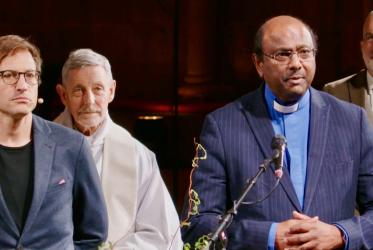The World Council of Churches (WCC) general secretary, Rev. Dr Olav Fykse Tveit, following a session on climate change at the World Economic Forum, currently underway in Davos, Switzerland, stressed the “significant role of financial policy-making by the states in addressing climate change.”
The forum, focusing on the theme “The Reshaping of the World: Consequences for Society, Politics and Business,” will continue until 25 January with participants from around the world.
Tveit endorsed points made by the former head of the British government’s economic service, Nicholas Stern, in his presentation in Davos. Tveit stressed that the “support of influential actors in the business sector is crucial for the work of the churches for climate justice.”
Lord Stern emphasized that a reaction to climate change at later stages will prove to be much more expensive than acting right now. He said that it can still be done, despite time lost due to the financial crisis in the past years.
Lord Stern also noted that joint efforts from governments, business and finance institutions, and civil society movements are the only way forward in addressing climate change.
He stressed the importance of rebuilding confidence in democratic institutions and the importance of decisions made with a long-term perspective. Support from churches and religious communities is significant in demanding ethical and responsible financial decisions, Lord Stern added.
In his conversation with the WCC general secretary following his presentation, Lord Stern also expressed interest in the WCC initiatives mobilizing civil society to address climate issues, as well as the work of the WCC’s member churches for climate justice.
Lord Stern further supported the WCC initiative for holding an interfaith summit on climate change ahead of the United Nations Climate Summit scheduled to take place in New York on 23 September this year. The UN secretary-general Ban Ki-moon has invited heads of state and government along with business, finance and civil society representatives as part of a global effort to mobilize action and ambition on climate change.
The interfaith summit called by the WCC will gather the input of faith communities from all over the world into this process, highlighting the specific contribution that faith traditions bring to the international debate about climate.
Tveit in his response expressed his “strong belief” in the potential for cooperation between the WCC, religious communities, civil society, business and financial sectors. He said that such cooperation could create the level of public support required in addressing climate change effectively.
“I was encouraged to hear this growing convergence in Davos, including acknowledgment of civil sector involvement,” Tveit added.
World Economic Forum Annual Meeting 2014
Follow WCC general secretary on Twitter@OlavTveit







